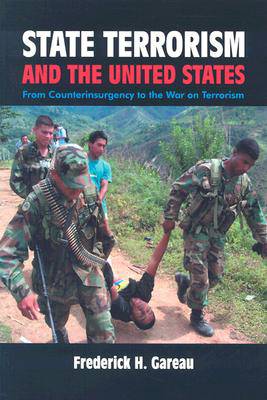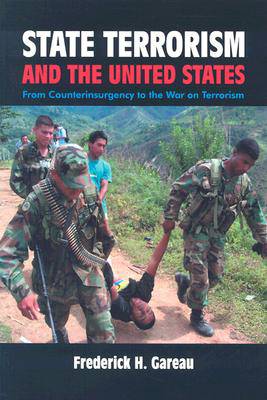
- Retrait gratuit dans votre magasin Club
- 7.000.000 titres dans notre catalogue
- Payer en toute sécurité
- Toujours un magasin près de chez vous
- Retrait gratuit dans votre magasin Club
- 7.000.000 titres dans notre catalogue
- Payer en toute sécurité
- Toujours un magasin près de chez vous
State Terrorism and the United States
From Counterinsurgency and the War on Terrorism
First Last
Livre broché | Anglais
29,45 €
+ 58 points
Description
This study exposes the support that administrations in Washington have given right-wing dictatorships that committed terrorism especially during the cold war and war on terrorism. It offers a critique of this latter war, and the study's portrayal of the earlier war serves as necessary background for understanding and evaluating the latter war. It rejects the narrow definition of terrorism insisted on by Washington that exempts terrorism committed by governments (state terrorism) from the definition, and for political reasons restricts the term solely to the private terrorism committed by private individuals or non-governmental organizations. Every one of the six truth commission reports used in the study-one each for El Salvador, Chile, Argentina, and South Africa and two with remarkably similar conclusions for Guatemala-- found that the governments were responsible for the great preponderance of terrorism and other acts of repression that occurred in their respective countries, much more so than the guerrillas. In El Salvador, Guatemala, and Chile the governments were found to be guilty of over 90 percent of the acts of terrorism and other acts of repression. Sponsored by the United Nations, successor governments to those that committed state terrorism, or the Catholic Archdiocese of Guatemala City, each of these reports is based on thousands of interviews mostly with surviving victims or their families and friends. All of the truth commission reports charged that the state terrorists committed unimaginable, unspeakable acts of cruelty and terrorism, what the truth commission for Argentina characterized as an "encyclopedia of horror." Advertised as a defense against communism and sometimes swayed by other motives-- racism in South Africa and Guatemala and anti-Semitism in Argentina-- the basic motive for the state terrorists was discovered to be the preservation of the status quo and the prevention of social change. They hunted down, tortured, terrorized, and murdered peasants, workers, students, teachers, priests, and nuns. The truth commission for Guatemala sponsored by the United Nations found the government of that country guilty of genocide. With some exceptions, a compliant national media engaged in self-censorship, even passing on the government inspired lies that held the guerrillas, not the government, responsible for the bulk of the atrocities. This and other evidence suggest that the so-called war on terrorism is a partial war that fails to target the main perpetrators, the state terrorists. The incomplete definition insisted on by Washington shields it from being accused of being a supporter of terrorism. Washington's support for state terrorist regimes typically has taken the form of training their troops in "counterinsurgency," now "counter-terrorism," and by providing funds and loans, military equipment, and diplomatic backing. The study indicates that Washington helped the Saddam Hussein regime and the apartheid regimes in South Africa successfully develop weapons of mass destruction. Saddam used poison against the Kurds and the Iranians. The racists in Pretoria produced six nuclear weapons, which they destroyed, following a request from Washington, before handing over the government to Nelson Mandela. In order to assure the continuing Kuwaiti financing of Saddam's war of aggression against Iran (1980-1988), the Reagan administration put the American flag on the ships of the sheikdom to protect them from Iran. This administration also became a co-belligerent in Saddam's "oil war," sinking half of the Iranian navy. It is arguable that without this aid Saddam would have been defeated and deposed by Iran in 1988. The support for Saddam by the Reagan administration and by that of the elder Bush in its early years puts in perspective Washington's later moral claims for initiating wars against the dictator. Support for Saddam in the Iran-Iraq war also serves the reader as an introduction to what is to com
Spécifications
Parties prenantes
- Auteur(s) :
- Editeur:
Contenu
- Nombre de pages :
- 254
- Langue:
- Anglais
Caractéristiques
- EAN:
- 9780932863393
- Date de parution :
- 25-02-15
- Format:
- Livre broché
- Format numérique:
- Trade paperback (VS)
- Dimensions :
- 154 mm x 230 mm
- Poids :
- 349 g







